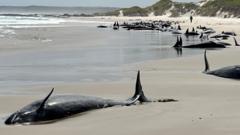In an unfortunate event, more than 150 false killer whales found stranded on a remote Tasmanian beach will be euthanised after rescue efforts failed. The whales, particularly vulnerable individuals, have been stranded for over two days, creating conditions deemed unsalvageable by marine experts.
### Mass Euthanasia of False Killer Whales Following Tasmania Stranding

### Mass Euthanasia of False Killer Whales Following Tasmania Stranding
A heartbreaking decision follows the stranding of over 150 whales in northwestern Tasmania.
As many as 90 whales from a total of 157 were still alive upon discovery, but complex conditions coupled with a difficult location have thwarted rescue attempts. Witnesses reported seeing a heartbreaking scene of juvenile whales in distress, with local residents expressing deep sorrow for the animals. The euthanasia decision, while painful, was made to alleviate their suffering.
Tasmania has a history of mass strandings, including a significant incident in 2020 that resulted in the loss of hundreds of pilot whales. In recent years, theories surrounding the causes of such beachings have emerged, with potential links to disorientation while hunting. The Department of Natural Resources and Environment continues to navigate the challenges of this sensitive situation, which holds significant cultural importance for the Aboriginal population.
As authorities manage the logistics of carcass disposal and public safety, they face the reality of an ecosystem threatened by such tragic events.
The harsh reality of wildlife stranding reflects broader environmental and ecological challenges, prompting urgent conversations about marine life conservation.
Tasmania has witnessed several mass whale strandings in recent years, emphasizing the importance of research into whale behavior and ecological preservation efforts.
Tasmania has a history of mass strandings, including a significant incident in 2020 that resulted in the loss of hundreds of pilot whales. In recent years, theories surrounding the causes of such beachings have emerged, with potential links to disorientation while hunting. The Department of Natural Resources and Environment continues to navigate the challenges of this sensitive situation, which holds significant cultural importance for the Aboriginal population.
As authorities manage the logistics of carcass disposal and public safety, they face the reality of an ecosystem threatened by such tragic events.
The harsh reality of wildlife stranding reflects broader environmental and ecological challenges, prompting urgent conversations about marine life conservation.
Tasmania has witnessed several mass whale strandings in recent years, emphasizing the importance of research into whale behavior and ecological preservation efforts.




















